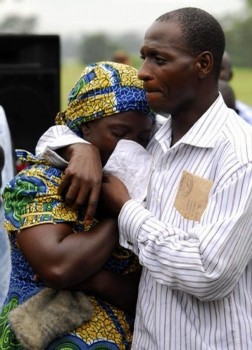ICC prosecutor adds new name(s) to case against Darfur rebels
April 19, 2009 (WASHINGTON) — The prosecution at the International Criminal Court (ICC) submitted a new application for the issuance of a summons to appear against rebel leaders suspected of leading an attack on African peacekeepers in 2007.

The redacted filing by the prosecutor last week provides the judges with additional information on questions they raised regarding the initial application against the rebels submitted last November.
The ICC’s third case on Darfur, opened in late 2007, investigates an alleged rebel attack on the Haskanita military base that left 10 African Union (AU) soldiers dead and one missing.
The counts against the three unnamed rebel commanders in the case filed under seal included war crimes of violence to life, intentionally directing attacks against personnel, installations, material, units or vehicles involved in a peacekeeping mission and pillaging.
The prosecutor’s office has been pressing the judges for months to make a quick decision on the November case citing the good prospects for the suspects to appear voluntarily in court.
However the judges at the Pre-Trial Chamber I rejected the requests saying the case is too complex and that they are occupied with reviewing another case against Sudanese president Omer Hassan Al-Bashir for whom they issued an arrest warrant on March 4th.
Furthermore the Pre-Trial Chamber I constitution has been changed and two judges were replaced. This generally means that more time is required for the new judges to get familiar with the Darfur case.
The second part of last week’s filing by the ICC prosecutor asks the judges for “expedited consideration” of his March 27th application.
“The Prosecution is of the view that given the current real prospects of ensuring the appearance of [Redacted] before the Court, [Redacted], the Prosecution respectfully requests that the PTC expedites its consideration of the Application” the filing read.
Ocampo also ask the judges to issue a summons to appear rather than an arrest warrant on the March 27th case.
It is not clear if the judges will treat the request any differently from the previous one. But this month the ICC prosecutor Fatou Bensouda speaking at the diplomatic hearing this month said that her office hopes “to have a decision from the Judges this month” on the rebels case.
Bensouda said that given the public stances by the Darfur rebels in which they committed to cooperating with the ICC “judicial proceedings could start soon”.
If the suspects end up appearing in The Hague it will likely place some countries particularly African states in a difficult position.
The arrest warrant issued for the Sudanese president received criticism from many countries in Africa on the grounds that it compromises the Darfur peace process.
Furthermore some African politicians including African Union (AU) Commission Chairperson accused the court of being biased against the continent in its selection of cases. A meeting of African ICC members is scheduled in June to discuss withdrawing from the court.
The AU has called on the UN Security Council (UNSC) to invoke Article 16 of the Rome Statute and suspend the case against Bashir.
But the victims of the attack on the African peacekeepers came from Nigeria, Mali, Senegal and Botswana.
It will be difficult to see the AU not supporting the ICC case against those figures believed to be behind killing of their own troops in Darfur.
The AU Peace and Security Council issued a statement in the aftermath of the attack stressing “the urgent need to bring the culprits to international justice”
(ST)

Sudanthinker
ICC prosecutor adds new name(s) to case against Darfur rebels
The prosecutor never hesitated to publish and announce the names of Sudanese government officials who he wanted to indict for what ever crimes he thought they committed, why is he being so touchy and sensitive to do the same to rebel leaders?
Is I because they serve the same master and he doesn’t want to step on the wrong toes?